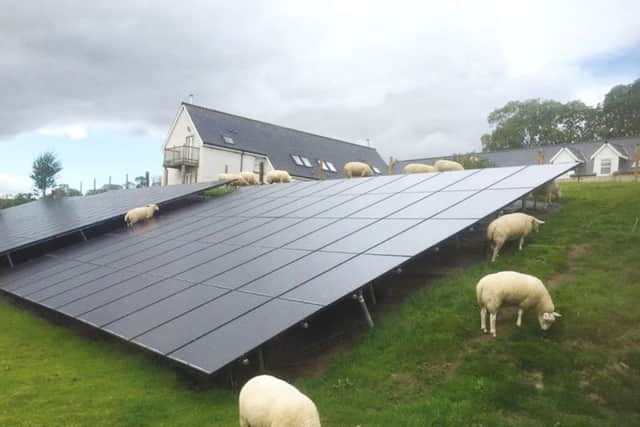Responsible business makes economic sense


The attributes of a responsible business come in many forms – from charity donations or supporting community groups to promoting equality, reducing resource use and recycling. Through a combination of carrot and stick these habits are now embedded in many businesses.
Government policy – from Holyrood, Westminster or Brussels – has perhaps had the most visible impact on our waste habits: you can’t visit a business today without spotting the recycling bins.
Advertisement
Hide AdAdvertisement
Hide AdThe responsible use of natural resources – be it for heating and lighting or vehicle fuel – may not be so visible, but it usually makes economic sense even if there is an initial financial cost.


Of course, it all needs to be put in the wider context of protecting the planet’s natural resources for future generations and the positive sentiments that it gives an organisation and the people working in it
The cost – even the time – involved in being a green business might sometimes seem like a luxury when you are trying to run a successful operation.
“I’d turn that on its head and say it would be a luxury for a business not to be resource efficient,” says Warren McIntyre, business support manager at Resource Efficient Scotland (RES).
Scottish businesses stand to save an estimated £2.9 billion a year, according to RES, a programme run by Zero Waste Scotland.


RES offers free support and advice to help businesses, universities and third sector organisations reduce costs by using their energy, water and raw materials more efficiently.
There are online tools, as well as a dedicated advice phone line. “We might do a telephone audit or an implementation adviser may do a site visit. We have been all over the country including Shetland and Stornoway,” says McIntyre.
“We also see ourselves as a gateway to support: if we see potential for a company we’ll direct them in the right direction. If someone wants electric vans, then we’ll point them to the Energy Savings Trust where there is funding.”
Advertisement
Hide AdAdvertisement
Hide AdSome impressive examples of businesses embracing the RES support are in country locations.
In Lochgoilhead, the Ardroy Outdoor Education Centre has invested in biomass for sustainable heating and hot water.
The centre hosts groups – including primary pupils – to experience the great outdoors, offering activities like walking, caving, canoeing, kayaking, raft building and gorge walking.
A key aim of the teaching programme is to develop a deeper relationship with nature. Environment, conservation and sustainability are all intrinsic to Ardroy’s business model.
With the combination of large visitor numbers, sleeping areas and domestic services there is high energy demand for both space heating and hot water.
Ardroy worked with RES to look at alternative options to replace its electric heating and hot water immersion systems.
An assessment by RES highlighted that the installation of a biomass boiler and wet heating system would potentially realise energy savings of around 25 per cent.
When factoring in renewable heat incentives, the predicated savings rose to 61 per cent with a payback period of 8.8 years.
Advertisement
Hide AdAdvertisement
Hide AdTo help implement the project, RES supported Ardroy with planning permission, specifications for the heating system, tendering, evaluating quotations and applying for an RES SME loan. “As an eco centre it is important that everything we do supports our ethos of sustainability,” says David Thorpe, Ardroy’s finance director. “The children and adults visiting us can experience a sustainable living and working environment during their stay, so having a biomass heating system is a wonderful addition to what we offer.
“The advice from Resource Efficient Scotland helped us identify a heating system which saved us money, reduced our carbon emissions and provided the capacity to extend the system at a later date.
“None of this would have happened without the help of the RES SME Loan and the RES support made the difference between us wanting to do something and actually achieving it,” he adds.
Ardroy is not alone, Highland Farm Cottages near Dingwall, also fitted a biomass boiler giving savings of £23,806 per year and reducing carbon emissions by 39.5 tonnes of CO2.
With an investment of £110,000 required for the upgrade from an existing LPG system, the company will see a payback on capital investment in 4.6 years. Again an SME loan helped fund the work.
“Through the impartial guidance of the RES team we have installed both an electrical vehicle charge point and a new biomass boiler with district heating system for 12 houses,” says Kenneth Mckenzie, the owner of Highland Farm Cottages.
With the success of the biomass boiler, a 44KW solar PV installation has now been added to generate electricity for the cottages.
As Mckenzie is dedicated to the principals of running a green tourism business, finding a more carbon efficient method of running the premises without compromising guest comfort or convenience was important.
Advertisement
Hide AdAdvertisement
Hide Ad“Our customers have told us that while holidaying in the Scottish Highlands they would rather stay with an accommodation provider that uses green energy and that they appreciate our cosy warm cottages after a day in the Scottish outdoors,” he adds.